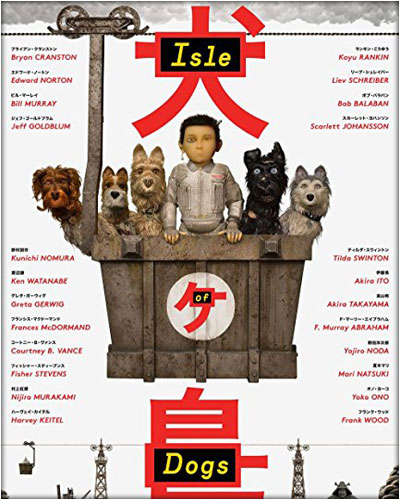What’s to watch on Netflix?
- 13 Apr - 19 Apr, 2024
Even though it is about a boy and a dog, Wes Anderson’s stop-motion animated film barely qualifies as children’s fodder. Isle of Dogs is a sarcastic hard-look into the world’s society, alienation, biasness, politics with the visual tone of an Akira Kurosawa film (if you don’t know who that is, google him up and watch his films).

Set in an alternative future, Japan is a strange totalitarian-minded democracy; the words, if you didn’t know, are contradictory. Everyone with a Japanese nationality speaks in their native tongue, which we as an audience, do not understand except when narrated by a translator or stylishly subtitled.
We do understand what the dogs are saying (they are voiced by Bryan Cranston, Bill Murray, Jeff Goldblum, Greta Gerwig, Frances McDormand, Courtney B. Vance, Fisher Stevens, Harvey Keitel, Liev Schreiber, Bob Balaban, Scarlett Johansson, Tilda Swinton, F. Murray Abraham).
The dogs are sensible, good-hearted, human-loving people, reduced to near-extinct status when an official decree forces them off of Japan into an island of waste. The reason for this exodus is entirely political – dogs, whether domesticated or stray, showed small signs of infections – nothing out of the ordinary. A proper cure was commissioned to end any and every disease, but it’s administration is stopped by a corrupt mayor. The mayor’s adopted son, then travels to the island to get his dog back.
Isle of Dogs is a sweet story at one hand, teaching the audience of innocence, love and loyalty. It is also dramatic and violent (one of the dog’s ears is bitten off). The Japan we see seems like a hodgepodge mix of visuals one would associate with the East’s point of the view of the West, and vice versa.
In understanding the dog’s language – American English – we are forced to side with the dogs’ point of view of the world, making Japan, its native and culture alien to our sympathies. Despite this, and a bucket-load of other apprehensions that require doctorate-level analysis, one still appreciates Anderson’s filmmaking mastery. It would have been a tough sell – both to the audience and the studio backers – but the end product is well worth it.
COMMENTS